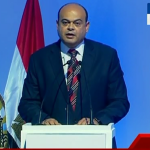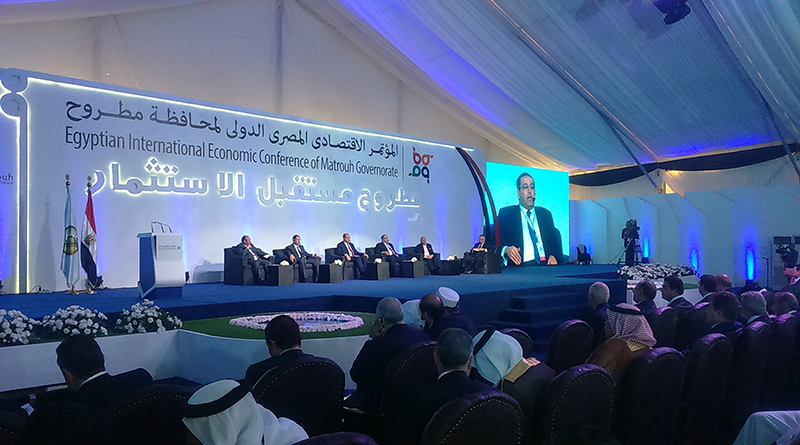by Maye Sadek
 In its effort to get out of its economic crisis, reflected in the insufficiency of the inflows of foreign currencies, Egypt held this week a new economic conference aiming to attract Arab investors.
In its effort to get out of its economic crisis, reflected in the insufficiency of the inflows of foreign currencies, Egypt held this week a new economic conference aiming to attract Arab investors.
A two-day conference, dubbed as “Matrouh, The Future of Investment,” started last Saturday in Matrouh governorate aiming to attract investment opportunities in different fields mainly from Arab countries.
Fifteen memorandums of understanding (MoU) were signed with Emirati, Korean and Egyptian companies for various projects. On top of those MoUs is the Gargoub port that will be built with investments of $10 billion.
The agreements included developing touristic beaches in famous areas in Matrouh governorate like Romel beach and Agiba site.
Other MoUs were related to salt production, olive oil, and mineral water bottling. In addition, an initial agreement was made to build three drainage pumping stations. The MoU was signed with Korean investors participating in the conference and also includes establishing an international medical tourist resort which attracts five million tourists.
The governor Alaa Abou Zaid said that the new three stations will be built in Alameen, Marsa Matrouh and Siwa cities. He further noted that Matrouh has long struggled from problems in its agricultural drainage and sewage systems.
Egypt held an international economic conference last March in which it signed agreements and memorandums of understanding with international companies worth $158 billion dollars.
However, those which turned into actual contracts and agreements were much less than this huge sum.
In all cases these efforts are helping the economy more on a longer term, while quicker fixes need to be done on the shorter term to attract foreign currency on one side and reduce its drainage on the other side.
Egypt’s net foreign reserves fell to $16.335 billion at the end of September, dropping by nearly $2 billion in one month, according to the Central Bank. The bank said the decline in foreign reserves was because Egypt repaid $1.25 billion for 10-year bonds that recently matured.
Credit ratings provider Moody’s said earlier this month that the drop in Egypt’s foreign reserves for three months in a row is “credit negative” for the country.
“The drop reflects continued dependence of Egypt’s balance of payments on external donor support, which is credit negative for the country’s external liquidity position,” Moody’s said in a report.
Gulf states Saudi Arabia, Kuwait, the United Arab Emirates and Oman pledged $12.5 billion in assistance and investments to Egypt in a major economic conference Egypt hosted in March 2015.
Moody’s, however, said “we forecast that the growth in deposits will slow in fiscal 2016.”
The credit ratings provider believes that relying on external support has secured a buffer for Egypt “against external vulnerabilities and balance of payments risks”, but added that “structural imbalances remain.”
“If reserves continue falling, it would place pressure on Egypt’s external position despite the country’s low current levels of external debt,” Moody’s said.
At the current level of reserves, Egypt can cover imports for 2.1 months, which is below the three months recommended by the International Monetary Fund. Moody’s projects that in the fiscal year, 2015/2016 the import cover will be 2.7 months, still lower than the IMF’s recommendation.
Years of political turmoil have hit Egypt’s economy hard. Foreign exchange reserves fell from about $36 billion before the January uprising in 2011 to $18.5 billion last July.
The prolonged period of reduced reserves are pressuring Egypt to devalue its currency.
On January 18, Egypt’s Central Bank allowed the Egyptian pound to weaken in front of the US dollar for the first time in six months. The bank depreciated the pound further in July, letting it slide to 7.73 to the dollar.
Several investment banks expect the Egyptian pound to be changing hands at 8.30 pounds to the dollar by year-end.
The price in banks reached 8.03 already after the Central Bank decision to let the pound depreciate by 20 piasters last week.
On the other hand, Moody’s report shows that Egypt was able to come out with a balance of payments surplus of $3.7 billion in the previous fiscal year, which ended in June 2015.
There was also an increase in foreign direct investments in the fiscal year 2014/2015 of $2.3 billion, compared to the year before, according to Moody’s.
“Increases in supplier credit and FDI inflows point to improving investor sentiment and investment inflows for greenfield, oil sector and real estate projects,” the report said.


